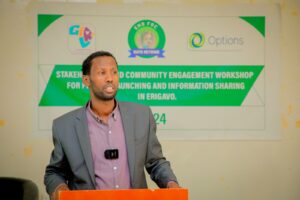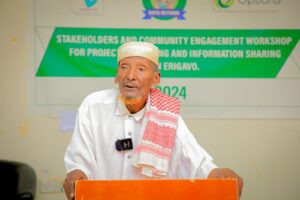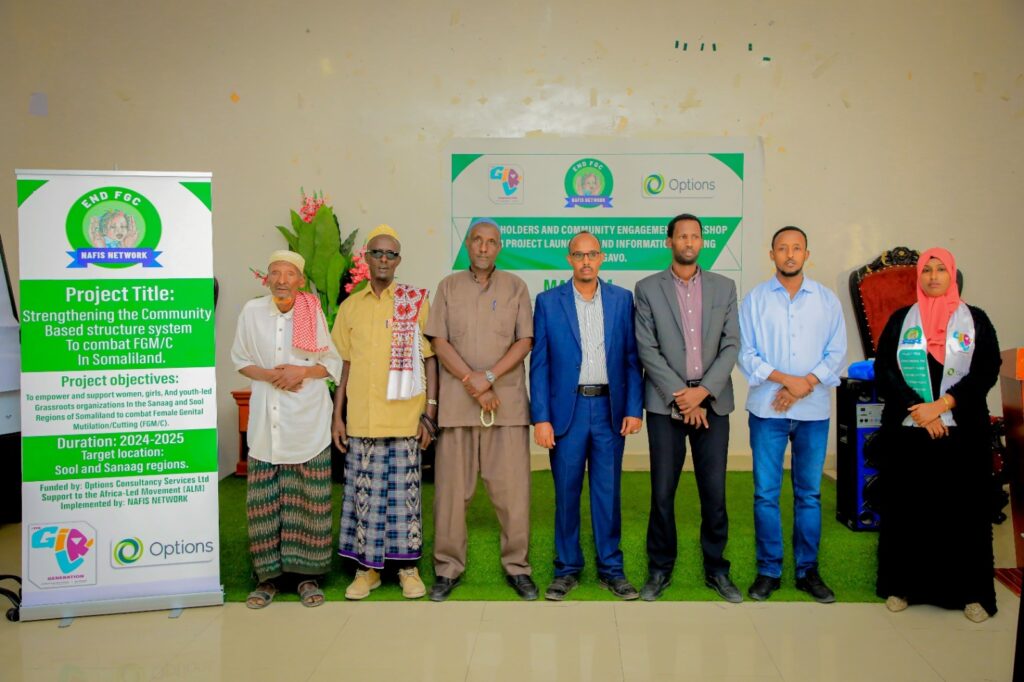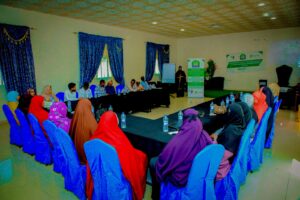Network against FGM/C in Somaliland (NAFIS), is a non-political, non-governmental, humanitarian, and anti-FGM Network in Somaliland with 20-member organizations its main purpose is to combat all forms of FGM/C in Somaliland through coordination, Networking, Lobbying, advocacy, research, documentation, capacity building, women empowerment, and survival support. This Term of Reference is set out to define the purpose, objectives, and expected outcome.
Project Background
NAFIS Network is currently implementing a project entitled ” Strengthening the Community-based Structure System to Combat FGM/C in Somaliland” NAFIS Network through funding by option consultancy service is spearheading a transformative initiative to combat Female Genital Mutilation/Cutting (FGM/C) in Somaliland. This joint effort represents a strategic partnership between two organizations committed to driving meaningful change at the grassroots level. Recognizing the multifaceted nature of the challenge, NAFIS Network and OPTION have joined forces to address the complex socio-cultural dynamics underpinning FGM/C prevalence in Somaliland.
Purpose of the Project.
The purpose of the project is to empower and support women, girls, and youth-led grassroots organizations in the Sanaag and Sool regions of Somaliland to combat Female Genital Mutilation/Cutting (FGM/C). This will be achieved through capacity-building, community awareness campaigns, survivor support, and advocacy efforts at both regional and national levels, with the ultimate goal of ending the practice of FGM/C and related issues such as early marriage and violence against women and girls in these targeted areas.
Project Target location
The project target location is Sanaag and Sool regions for targeting the following main villages and IDPs including Yufle, Kulmiye, and October IDPs in Erigavo, Gar-adag, Fadhi-gab, Wadamo-goo
OPENING MAKERS
Muna Osman, representing NAFIS Network in Erigavo, Sanaag regions, extends a warm welcome to everyone who participated in the launching of this new project which NAFIS will implement in target villages in the Sanaag and Sool regions. On behalf of her organization, she stated ” I am truly honored to open this significant event, marking the commencement of an endeavor that holds immense promise and potential for our community.
 Today, we embark on a journey of collaboration, innovation, and progress. Together, we are laying the foundation for a project dedicated to combating the harmful practice of FGM/C, a practice that has long affected the health and well-being of our young girls and women. With a shared vision of prosperity and development, we stand united in our commitment to fostering meaningful change and empowerment. By working together, we aim to protect the health and well-being of women and young girls, safeguarding them from the detrimental effects of this traditional practice.
Today, we embark on a journey of collaboration, innovation, and progress. Together, we are laying the foundation for a project dedicated to combating the harmful practice of FGM/C, a practice that has long affected the health and well-being of our young girls and women. With a shared vision of prosperity and development, we stand united in our commitment to fostering meaningful change and empowerment. By working together, we aim to protect the health and well-being of women and young girls, safeguarding them from the detrimental effects of this traditional practice.
It is an honor to stand before you today as the Deputy Governor of Sanaag Province, Jama Mohamed Warsame, and lend my voice in support of this crucial initiative. As we gather here in Erigavo for the launch of this project, I am filled with a sense of optimism and determination to drive positive change within our community.The approach taken by NAFIS Network, emphasizing community-led efforts, is precisely what is needed to accelerate the eradication of Female Genital Mutilation/Cutting (FGM/C) in Somaliland. Today marks not only the inauguration of a project but also a pivotal moment in our collective journey towards raising awareness about the consequences of FGM/C.
 Sheikh Abdilahi, the representative from the Ministry of Religion in the Erigavo region, emphasized the pivotal role of religious and traditional leaders in this endeavor. “We are committed to mobilizing our networks to drive social norm change and put an end to this harmful practice,” he stated during his address. He further emphasized the importance of using the term “FGM Zero Tolerance” instead of “FGM/C mitigation,” highlighting the urgency and firm stance required to eradicate this practice entirely.
Sheikh Abdilahi, the representative from the Ministry of Religion in the Erigavo region, emphasized the pivotal role of religious and traditional leaders in this endeavor. “We are committed to mobilizing our networks to drive social norm change and put an end to this harmful practice,” he stated during his address. He further emphasized the importance of using the term “FGM Zero Tolerance” instead of “FGM/C mitigation,” highlighting the urgency and firm stance required to eradicate this practice entirely.
A respected community chief, Abdullaahi Du’aleh, stood before the assembled crowd, his demeanor reflective of his years of wisdom and leadership. Addressing the gathering, he spoke with a gravitas that commanded attention. “My fellow community members,” he began, his voice resonating across the space, “I urge all of you to take an active role in this crucial project. We have an opportunity before us to make a lasting impact, to protect our daughters and sisters from the harms of FGM/C. Let us seize this moment and work together, utilizing the resources and support provided to us.”
His words carried weight, offering not just encouragement but a call to action, a rallying cry for unity and determination in the face of a deeply ingrained tradition.
During the gathering, Mohamed Hassan, a dedicated member of the Erigavo district local council, stepped forward to add his voice to the conversation. With a sense of urgency in his tone, he emphasized the critical importance of the initiative at hand. “My fellow council members and community leaders,” he declared, his words echoing off the walls, “We cannot afford to delay any longer. This project, along with the regulations it proposes, represents our best chance to finally put an end to the cycle of harm caused by FGM/C. We owe it to our future generations to act decisively, to ensure that they grow up in a world free from this barbaric practice.”
His impassioned plea underscored the gravity of the situation, driving home the necessity of immediate and concerted action. In his words lay a challenge, a reminder that the time for complacency had long passed, and that the responsibility for change rested squarely on their shoulders.
It is with great pleasure and privilege that we welcome Nafis Network, representing the esteemed Ministry of Employment and Social Affairs. Nafis Network stands as a beacon of hope and progress in our collective efforts to address pressing societal issues, particularly focusing on the eradication of Female Genital Mutilation (FGM) and other critical challenges. Their collaboration with the Ministry underscores a dedicated commitment to effecting positive change within our communities.
NAFIS Network embodies the spirit of proactive engagement and grassroots advocacy, serving as a vital conduit between the Ministry and the communities it serves. Their invaluable contributions and unwavering dedication reflect a shared vision for a more equitable and just society.
Stakeholder and Community Engagement Workshop for Project Lunching and Information Sharing in Erigavo.
A Stakeholder and Community Engagement Workshop was conducted to facilitate information sharing and garner support for an upcoming project launch in Erigavo and surrounding villages in the Sanaag and Sool regions. The workshop brought together a diverse group of 30 attendees, including government representatives, project line ministries, Civil Society Organizations (CSOs), women-led organizations, and representatives from six villages: Erigavo, Yusfle, Fadhi-gaab, Gar-adag, Wadaamo goo, and Ainaba.
Key Actions for Future Engagement After the Project
- Sustained Advocacy
Maintain momentum in advocating for policy reforms and legislative measures to support the eradication of FGM/C in Somaliland. This includes engaging with policymakers at both regional and national levels to ensure that the issue remains a priority on the agenda.
2. Community Mobilization
Continue to mobilize communities and raise awareness about the harmful effects of FGM/C. This can be achieved through ongoing education campaigns, workshops, and dialogues aimed at changing social norms and attitudes surrounding the practice.
3. Capacity Building
Invest in the capacity building of local organizations, community leaders, and healthcare professionals to effectively address and respond to cases of FGM/C. This includes training on prevention strategies, survivor support, and advocacy techniques.
4. Data Collection and Research
Conduct regular monitoring and evaluation activities to assess the impact of interventions and gather data on the prevalence of FGM/C. This information will be essential for informing future programming and policy decisions.
5. Survivor Support Services
Ensure the availability of comprehensive support services for FGM/C survivors, including access to healthcare, counseling, legal assistance, and livelihood support. Empower survivors to become advocates for change within their communities.
6. Partnership Strengthening
Foster strong partnerships and collaboration between government agencies, civil society organizations, religious leaders, and other stakeholders involved in the fight against FGM/C. Leverage collective expertise and resources to maximize impact.
7. Youth Engagement
Engage youth as key agents of change by providing them with opportunities for leadership, education, and advocacy on issues related to gender equality and reproductive health. Empower them to challenge harmful traditional practices and promote positive social norms.
8. Sustainability Planning
Develop long-term sustainability plans to ensure the continued implementation of initiatives aimed at combating FGM/C beyond the duration of specific projects. This may involve institutionalizing interventions within existing structures and securing ongoing funding and support.
By prioritizing these key actions, we can collectively work towards the goal of achieving FGM Zero Tolerance in Somaliland, safeguarding the health, rights, and dignity of women and girls for generations to come.


